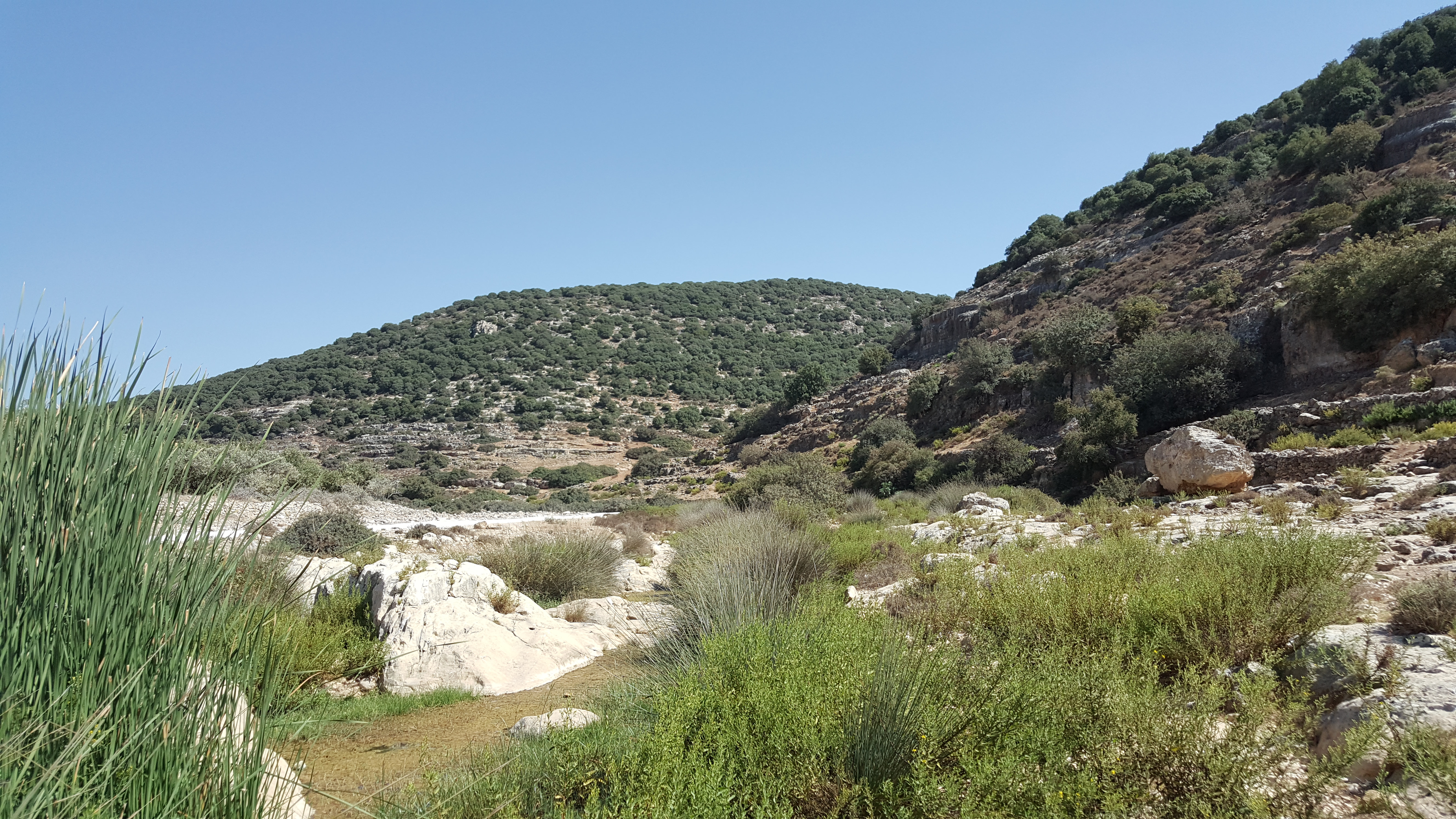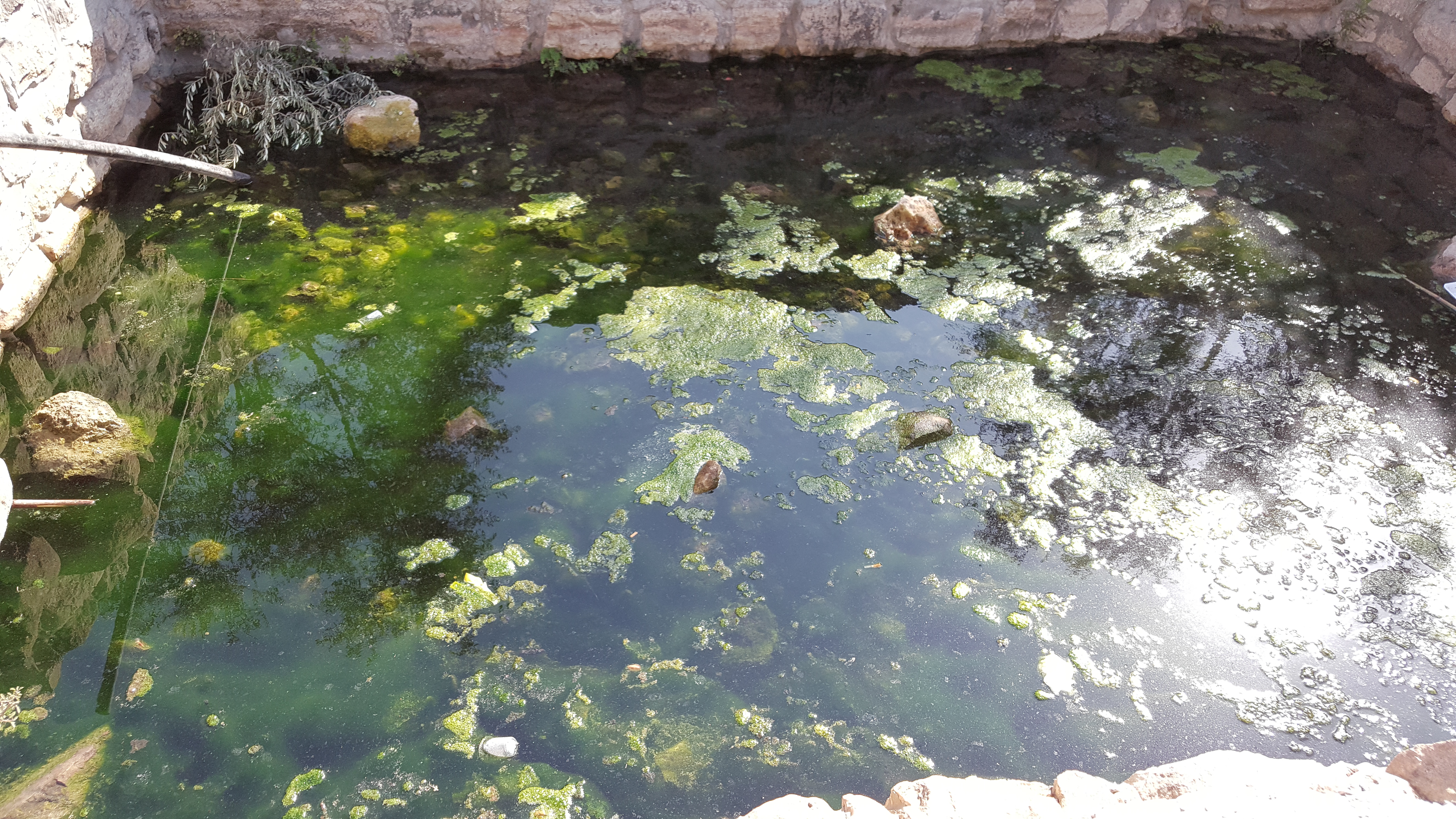Human rights violations as a Destruction of the biodiversity elements: Case study Wadi Saride Catchment / Salfeet City- Palestine.
 |
Palestinian Association for Environmental Development |
Final report:Human rights violations as a Destruction of the biodiversity elements: Case study Wadi Saride Catchment / Salfeet City - Palestine.[pdf2.27MB] |
 |
Ghanem, Marwan | |
 |
||
 |
US$3500 |
Research Background Final Report (abstract) Others

Landscape and biodiversity threat from the wastewater.

Spring polluted with wastewater in the study area.
Research Background
Since more than thirty years, the raw wastewater flow of the Areil settlement, one of the largest settlement in the West Bank
as well as other adjacent settlements is draining into the adjacent Palestinian wades, where the natural springs are emerging
forming a river of wastewater. Therefore, the springs there are polluted from the wastewater and accordingly, the water quality
results of these springs indicates that spring water is not fit for not only drinking -, but for agricultural purposes.
The natural view of the Wadi was destroyed after the flows there.
A socio economic crisis was happened for the Palestinian communities in the adjacent Palestinian villages.
For the majority of people who are living adjacent to the wastewater flow along the wades is so difficult for them to live and
act in a normal way of living because of the environmental caused problems. Thus, a social, legal, economic and environmental
study about these crises is of paramount importance to determine the extent of violations of international law committed by Israel,
to establish its responsibility and to put forward means of reparation as well as environmental awareness campaigns.
The included Research Topics are Environmental analysis, Socio Economical and political analysis, Human and environmental Rights,
Environmental Campaigns. The main objective of the research is to determine the pollution degrees on water sources of the SARIDA
CATCHEMENT in Salfeet city area/West Bank, pollution effects on the quality of surface water flow, groundwater wells and springs
water that are located along the Wadi catchment that should be recognized. Studying the variations in water quality along the Wadi's
different stages also should be recognized. The effects of the wastewater flow on the social and economic aspects of resident's
life in the area should be shown. Study the social, legal, economic and environmental elements of the Sarida Catchment in order
to translate the International law toward the Israeli violations to the Palestinian Environment in Sarida Catchment. This should
be accompanied by environmental awareness campaigns. The project will serve all the communities around the wastewater flow of the
Wadi. It is expected to serve 5 rural communities and one town Salfit.
The population that are affecting from this problem are
more than 50000 Palestinian inhabitants and the area covers around 50 km2 .The study area is hilly region and extends from Salfeet governorate north, to the south-west of Ramallah governorate. Rainfall and
discharging wastewater get together and flow through the Wadi towards Israeli territory and ends with the Mediterranean Sea.
The climate is semiarid, dry long summer with average temperature 22°C) and rainy short winter with average temperature 11°C) , with nearly 650 mm of rainfall (World Bank, 2009). SARIDA CATCHEMENT consists of the surface water that include Wadi drainage mixing with wastewater and the springs and groundwater, which is a part of the western aquifer of West Bank which has a high water quality, represents 50% of Israeli fresh water and used by many wells that exist in western Israeli territories (World Bank, 2009).
There are no previous conducted studies regarding SARIDA CATCHEMENT contamination neither from the Palestinian side or the Israeli side,
but many related studies showed some important results that indicate, evaluate and prove the role of wastewater in affecting water
quality of the Wadis flow and groundwater which also includes spring water. However, according to Mahmoud and Al-Sa'ed (1997),
Israeli settlements in West Bank stand for an enormous responsibility of the Wadi's pollution which respectively is 40% of the
pollutions sources.
[Jun. 2018]
Final Report (abstract)
The research titled Human rights violations as a Destruction of the biodiversity elements is conducted in Wadi Saride Catchment/Salfeet City - Palestine.
This study discussed the social- economic and environmental impacts of wastewater on Sarida drainage basin. This study has been accomplished through carrying out
biological and physio-chemical characterization for water samples from various springs in Sarida valley in order to specify the quality of the springs' water.
Moreover, the socio-economic effects of wastewater on the population in the study area were discussed.
The study was relied mainly on using the analytical field methodology
to analyze the samples of the springs water. It also used the applied quantitative methodology to check the results of the questionnaire that was distributed between the
farmers in Sarida valley. The study has found that the flowing wastewater from the Israeli settlements that lie in the study area is regarded as the main source in polluting
the underground water in the basin. The results also revealed that 84% of the population of the Palestinian villages that lie in Sarida basin use open septic tanks in getting
rid of their wastewater then draining it in the nearby valleys which in turn increased the percentage of pollution. Moreover, results also pointed that 82% of Sarida valley
population has left their homes in Sarida valley to the nearby villages because of the spread of bad smells in the valley.
The results also revealed that 45.5% of Sarida valley
farmers have stopped planting their agricultural lands because of wastewater which in turn lowers the percentage of agricultural production. It was obvious through analyzing the
water samples that all the springs in the study area are biologically polluted by the bacteria which is regarded as an indicator wastewater pollution. The chemical analyses also
revealed that all elements lie within the allowed limits according to the World Health Organization except iron which exceeded the allowed limits in Al-Fawwar and Al-Maasser springs
which indicates the pollution of these springs.
[Jul. 2018]
Others
